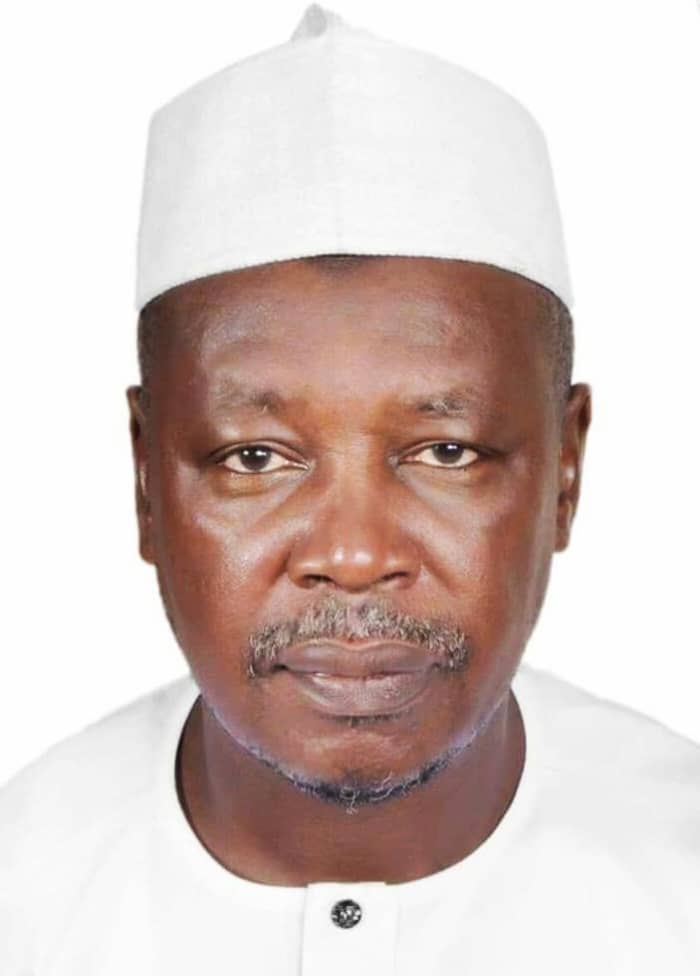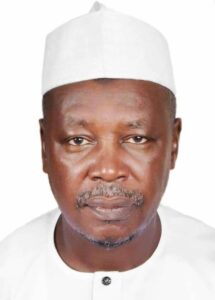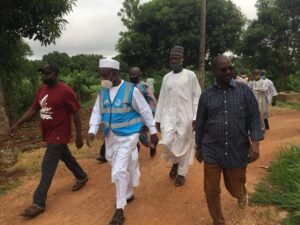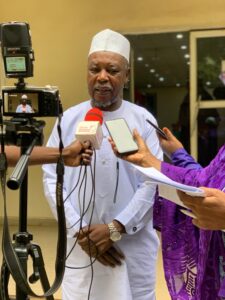
Comrade Sanusi Maikudi work in Kaduna State Water Corporation (KADSWAC), not as the head of the workers union but as the Managing Director and Chief Executive Officer. He started his career as a human rights activist, and this rightist perspective reflects in his present responsibility as the helmsman of one of Nigeria’s leading water utilities. Previously, he was also Senior Special Assistant, Project Monitoring and Evaluation to the Kaduna State Governor between 2003- 2007.
Born in Kafanchan, Kaduna State, Nigeria, confidentially, today, December 24, is his 58th birthday. Sanusi holds a first degree in Architecture and a Master of Business Administration (MBA) from Ahmadu Bello University, Zaria.
Makudi spoke to eWASH’s Babatope Babalobi and Esther David on several issues, including how he is tackling systemic corruption in the KADSWAC.
How do you get the title ‘Comrade’?
I was one of the Student Union leaders when I was a University student from 1983 to 1987. It originated from being a Student leader at Ahmadu Bello University. I was the Secretary General of Youth Solidarity on Southern Africa (YUSSAN), which is one of the arms of the Student Union, and also the Director of Ideology of the Movement for Progressive Nigeria. I was also part of the Student Representative Assembly representing the Faculty of Engineering.
Over three years since you were appointed as the Managing Director of the Kaduna State Water Corporation. What have been your main achievements since you assumed office?
I resumed office in February 2015. It is almost four years on the seat. It will be four years by February 2023.

Managing utilities in this part of the world is a work in progress. I assumed office shortly after the corporatisation of the former Kaduna State Water Board. You may recall that a new government came in on May 29, 2015, and set the machinery in motion for reforming the Kaduna State Water Board. The new government updated the Kaduna State Water, Sanitation and Hygiene law and policy. Out of the reform, new institutions and priorities emerged, such as the first-time creation of the Water Services Regulatory Commission and the transformation of the Kaduna State Water Board into a Water Corporation.
Why I prioritise stakeholders’ engagement
My assignment’s main thrust was to translate that reform’s vision into practice. Corporatisation is business-oriented service delivery, unlike previous public service delivery. So part of my achievements was launching an in-house transformation plan on arrival at Kaduna Water Corporation, which we called the ‘five points transformation agenda’.
The five points transformation agenda are:
- The first element is the workforce.
- The second element is water production and volume.
- The third element is an increase in water production and service in terms of coverage, which will automatically translate into higher revenues.
- The fourth element is stakeholder engagement.
The utility is a multi-stakeholder enterprise dealing with different stakeholders. You have the regulator, supervising ministry, domestic and commercial water consumers, contractors, consultants, development partners, etc. So, we prioritised stakeholder engagement because no one institution can do it alone.
- The fifth element is complying with due process and the rule of law. When you manage a water Corporation that is established and guided by international best practices policies, you avoid arbitrariness or personalising issues. So we mainstreamed the rule of law and due process. We complied with all the laws governing the utility and other general laws that apply to the water supply, sanitation, and hygiene.
After formulating the five points transformation agenda, we created the transformation agenda, bringing in actionable, smart goals and targets for each department, unit, water treatment plant, and strategic business unit. We also took steps to sanitise the workforce.
How soon will all your great work for the past four years translate into improved coverage?
As I have said earlier, managing a utility and leaving no one behind is a work in progress. It is a function of investment. Investment is derived from the political will, availability of resources and technical and managerial capacity in packaging and delivering projects. In Kaduna State, we have three clusters based on the senatorial zones:
- The northern zone, which is based in Zaria and its environs, has been concluded. There was an investment of over 200 billion naira on the Zaria water supply expansion sanitation project that increased the water treatment capacity by constructing a new dam, a one hundred and fifty million litres capacity water treatment plant, construction of ten new reservoirs, and renewing the transmission and the distribution infrastructure. The Zaria component was treated, and Mr President commissioned it.
- Greater Kaduna is defined as fifty kilometres north, south, west, and east of the Kaduna post office, which is assumed to be the centre of Kaduna centre for the business district. The Greater Kaduna Water Supply project was designed during the tenure of former Governor Nnamdi Sambo when he assumed the governorship of Kaduna state in 2007, but it is now obsolete. We are planning to redesign the Greater Kaduna Water Supply Project
What will you say has happened to Kaduna State Water Corporation? At some point, it used to be the signpost of water utilities in Nigeria.
KADSWAC is still one of the bright golds in Africa. This year, we received the Climate Smart Utility award from International Water Association in Denmark. The award was given based on what we are doing. Also, the World Bank has recognised us this year as the Water utility of the future. Kaduna State Water Corporation is still one of the best in the country, but that does not mean it is in an ideal situation. Aged Infrastructure, low recruitment, and rapid urbanisation are the major challenges facing KADSWAC, which tend to limit the corporation’s success.
In the next five years, almost all our staff will retire….
- Our water treatment plant was built in 1929 and is still operational. Some of the transmission lines used to send water to the town are still the old one that was laid down in 1929; which was supposed to have been replaced after forty years but is still there with us in 2022.
- Another one is rapid urbanisation leading to a rise in water demand by the people that migrated from the rural areas to the urban areas.
- Also, there was no recruitment in the utility for a long time. We have an ageing workforce with an average of fifty-five years old. That means, in the next five years, almost everybody will be retired. People died, left, and retired, and there was no recruitment. Now we have our staff working on different projects in other states.
- Another challenge is global inflation, financial crisis and water tariff.
Professionalism, the efficiency of the workers, aged infrastructure, relatively low investment and difficulty in managing different stakeholders at a time is creeping and causing serious challenges to all utility and not only in Kaduna state.
How are you coping with the challenges of corporatisation? We learnt Kaduna State Government no longer finances the KADSWAC.
It is very challenging; the government is saying that having been corporatised, we should be independent and economically sustainable and that whatever we spend on water production, we should recover It from water sales. That is the concept of the government, but we proposed to the government that it is doable, but it cannot be done as an event. It has to be a process.
We proposed to the government a five-year framework of cost sharing. We identified six elements of a reformed water utility.
- One is a capital investment; it must remain the responsibility of the government to do infrastructure in areas we do not have any for now.
- For the power supply, water treatment, personnel cost, operation, repair, maintenance and overhead, we proposed a five-year frame before which we can be 100 per cent autonomous.
- We proposed we start by paying salary and wages in the first year.
- In the second year, we shall shoulder the overhead of twenty million per month in addition to salary and running costs.
- In year two, we should be able to generate and invest over 1.4 billion from the water sector while government should provide power, water treatment chemicals and energy.
- In the third year, in addition to what we did in the first two years, we would take one of the water treatment chemicals.
- In the fourth year, in addition to what we did in the first three years, we propose to finance fifty per cent of the aluminium sulphate consumption while the government will fund the remaining fifty per cent.
- In the fifth year, the government can hand over energy.
The framework is that government funding shall gradually reduce while internal revenue will grow.
- In year one, we 35% while the government took 65% of all expenses.
- In year two, we took 53% while the government took 47%.
- In year three, we maintain 53% while government take 47%.
- In year four, we took 68% while the government took 32%.
- In year five, we took 76% while the government took 24%.
- In year six, they should leave us alone.
The government has approved this but directed us to bring a Council memo to the State Executive Council to debate it so that once it is adopted as a framework, they will be a contract between the State government and the Board of Directors, and all parties will adhere to this religiously.
What do you think is the role of the private sector in water service delivery?
I remember that in my five points transformation agenda, one of the elements is stakeholder engagement and the private sector investors are part of the stakeholders. So, I welcome the participation of the private sector in the WASH sector, which is fundamental. They can come in any part of the value change. It is a welcome idea. Suppose there is a firm with the technical efficiency to invest and operate the plan better than we are doing. It is in the system’s best interest if investors participate in managing transmission, distribution or revenue collection. We have received many proposals, directly and indirectly. We are analysing and reviewing it to find those with value to add because some investors are only investors by name. We are really after those with technical competence, industry experience and attitude to add value, be it financial, knowledge or skill.
Hitherto, the perception is that we are a government department where people are expected to pay their taxes and get service. However, with the participation of the private sector, we need to change the attitude and perception internally among the staff and external stakeholders, particularly the water consumer who view it as a gift of nature. Truly, water is a gift of nature, but it is buried underground or found in the rivers. You must pay if the value is added and delivered to your premises.
In most states in Nigeria, there is always a cat-and-mouse relationship between the Ministry of Water Resources and the water utility. How are you managing your relationship with the supervisory ministry?
We are supervised by the Ministry of Public Utilities Works and Infrastructure, which took over the Ministry of Water Resources mandate. I have a cordial relationship with them. Even the pioneer Commissioner that we worked for more than two and half years together, when she moved to another portfolio, we had to celebrate her because she was available to us and dynamic. When I heard other utilities complaining about their Board of Directors or their mother ministries, I said it ought not to be so. Referring back to my transformation agenda, element No 4 is stakeholder engagement. The Board of Directors, the Supervising ministry, and the Water regulatory commission are all part of our stakeholders.
So as a manager, you must develop the capacity for multi-partner coordination and engagement. There are no rivals. We must listen, engage and work with our stakeholders, and if you develop the right frame of mind, you can work with virtually everybody. Moreover, you establish rules of engagement where you can decline if somebody asks you to do something illegal, unethical, immoral or not in the system’s best interests, but nobody can avoid working with stakeholders. The better you learn to work with the stakeholders, the better for you.
How do you ensure that integrity is promoted in KASWAC?
I will refer back to my five-point transformation agenda. I anticipated all this, and that is why we have the five-element process, the rule of law, because if you hold a public office, it is a position of trust and responsibility. You must be accountable for whatever you manage. We made it clear right from day one whatever is to be done must be done through due process, and anything done must comply with the rule of law.
I am the biggest thief catcher; I sacked 50 staff because of corruption
Corruption is everywhere in our national life, so you must hold your hammer and knock it down wherever it raises its head. I have sacked nearly fifty staff based on corruption, those recruited into the corporation illegally, and those who stole revenue, even if it was in the previous regime. We live by personal example. Once it is recorded in their file, they are flushed out of the system. If there is an allowance to be paid, everybody knows about it because it is not to be done in secret. Also, staff who embezzle revenue are dealt with to serve as a lesson to others. As Mr President said, if you do not kill corruption, corruption will kill all of us. It has already greatly damaged our national life, but prevention is better than cure.
We have partnered with the Code of Conduct Bureau and some management consultants. We subscribed to a whistle-blower policy, where the MD pledged that if any staff knows of any act of corruption or illegality, if reported, they will get 10,000 naira before investigation. After investigation and confirmation, the amount is doubled, and I become the biggest thief catcher in the corporation because I am paying for information. Everybody must be trained, sensitised, and inducted into the anti-corruption struggle so that the limited resources must be used for the intended purpose.
Thanks for your effort.